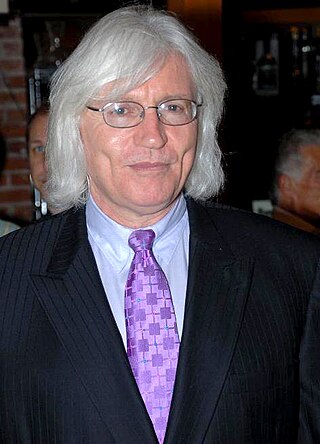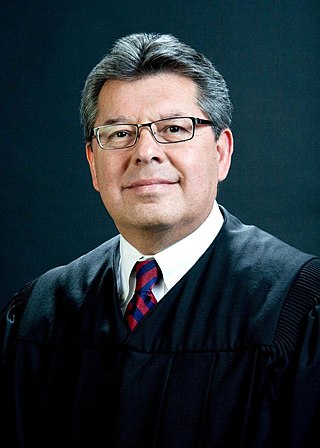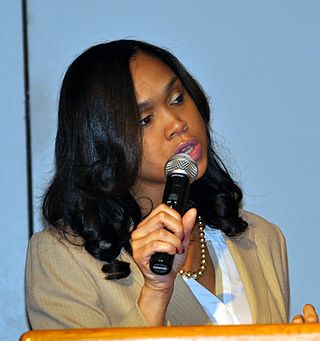
Thomas Arthur Mesereau Jr. is an American attorney known for defending Michael Jackson in his 2005 child molestation trial, as well as Mike Tyson, Bill Cosby and, in 2023, Danny Masterson, a case in which Mesereau was sanctioned by the judge.
The trial of Kenneth Lay, former chairman and CEO of Enron, and Jeffrey Skilling, former CEO and COO, was presided over by federal district court Judge Sim Lake in the Southern District of Texas in 2006 in response to the Enron scandal.
Kevin A. Ring is a former American attorney and congressional staffer; he served Republicans in both the House and the Senate, including U.S. Representative John T. Doolittle (R-CA). He also served as a counsel on the Senate Judiciary Committee's Constitution, Federalism and Property Rights Subcommittee.
A U.S. Securities and Exchange Commission and U.S. Attorney probe into trading in the shares of ImClone Systems resulted in a widely publicized criminal case, which resulted in prison terms for businesswoman and television personality Martha Stewart, ImClone CEO Samuel D. Waksal, and Stewart's broker at Merrill Lynch, Peter Bacanovic.
Claud Roderick "Rick" Koerber is an American convicted felon who was found guilty in federal court of orchestrating and running a $100 million Ponzi scheme, one of the largest in Utah's history. Koerber took in $100 million from 2004 to 2008 by promising his victims returns of 24% to 60% annually, but spent $50 million on Ponzi payments to prior investors, and also bought luxury items to give his scheme an appearance of profitability.
Crime in California refers to crime occurring within the U.S. state of California. The principal source of law for California criminal procedure is the California Penal Code.

Edward John Davila is an American lawyer who serves as a United States district judge of the United States District Court for the Northern District of California. He was previously a state court judge on the Santa Clara County Superior Court from 2001 to 2011.
Theranos Inc. was an American privately held corporation that was touted as a breakthrough health technology company. Founded in 2003 by then 19-year-old Elizabeth Holmes, Theranos raised more than US$700 million from venture capitalists and private investors, resulting in a $10 billion valuation at its peak in 2013 and 2014. The company claimed that it had devised blood tests that required very small amounts of blood and that could be performed rapidly and accurately, all using compact automated devices that the company had developed. These claims were proven to be false.
The Mantria Corporation Ponzi scheme has been described as the "biggest green energy scam" in United States history. A Federal judge in the Securities and Exchange Commission's civil case found Mantria had scammed more than $54.5 million “by egregiously, recklessly, knowingly, and shamelessly perpetrating a fraudulent scheme” that used “misrepresentations, omissions, and blatant lies to induce unsuspecting and unwitting victim investors to liquidate the equity in their homes and take out bank loans to invest in Defendants’ scheme, which was nothing more than smoke and mirrors.” On November 16, 2009, the U.S. Securities and Exchange Commission charged four people who targeted those nearing retirement age who were seeking real estate and "green" investments. Many of these securities were offered by Mantria Corporation.

Elizabeth Anne Holmes is an American biotechnology entrepreneur who was convicted of fraud in connection to her blood-testing company, Theranos. The company's valuation soared after it claimed to have revolutionized blood testing by developing methods that needed only very small volumes of blood, such as from a fingerprick. In 2015, Forbes had named Holmes the youngest and wealthiest self-made female billionaire in the United States on the basis of a $9-billion valuation of her company. In the following year, as revelations of fraud about Theranos's claims began to surface, Forbes revised its estimate of Holmes's net worth to zero, and Fortune named her in its feature article on "The World's 19 Most Disappointing Leaders".

Marilyn Mosby is an American politician and lawyer who served as the State's Attorney of Baltimore from 2015 to 2023. Mosby gained national attention following the killing of Freddie Gray in 2015, after which she led a highly publicized investigation and unsuccessful murder prosecution of the police officers who arrested and transported Gray.
Mark (Meir) Nordlicht is the founder and former chief investment officer of Platinum Partners, a U.S. based hedge fund, which came to be known for its investment strategies becoming the subject of a series of controversial and legal actions. In a high-profile case, government prosecutors leaked that Nordlicht ran a “Ponzi scheme”, only to be convicted of a lesser charge and sentenced to home confinement.
Ramesh "Sunny" Balwani is a businessman, former president and chief operating officer of Theranos, which was a privately held health technology company founded by his then-girlfriend Elizabeth Holmes. He and Holmes fraudulently represented that they had devised a revolutionary blood test that required only small amounts of blood, such as from a fingerstick. Both Balwani and Holmes were convicted of fraud. The consequences of the fraud led to the collapse of Theranos and the loss of billions of dollars to investors.

Ian Gibbons was a British biochemist and molecular biology researcher who served as the chief scientist of the US company Theranos, which was founded by Elizabeth Holmes. For more than 30 years, Gibbons performed research in medical therapeutics and diagnostic testing prior to joining Theranos in 2005. He attempted to raise issues with Theranos' management about the inaccuracy of their testing devices.

The two criminal trials of Paul Manafort were the first cases brought to trial by the special counsel's investigation into Russian interference in the 2016 presidential election. Manafort served as campaign chair for the Donald Trump 2016 presidential campaign from June 20 to August 19, 2016. In July 2017, the FBI conducted a raid of Manafort's home, authorized by search warrant under charges of interference in the 2016 election. Manafort and his business assistant Rick Gates were both indicted and arrested in October 2017 for charges of conspiracy against the United States, making false statements, money laundering, and failing to register as foreign agents for Ukraine. Gates entered a plea bargain in February 2018.

The Inventor: Out for Blood in Silicon Valley is a 2019 American documentary film, directed and produced by Alex Gibney. The film revolves around Elizabeth Holmes and her former company Theranos. It is considered a companion piece to the book, Bad Blood: Secrets and Lies in a Silicon Valley Startup.
Channing Rex Robertson is a professor emeritus of chemical engineering at Stanford University. He held multiple significant roles at startup Theranos, founded by his student Elizabeth Holmes. Robertson took on major responsibilities at the company prior to its collapse, including becoming its first board member, engaging with venture capitalists, and recruiting biochemist Ian Gibbons. He retired from Stanford in 2012, becoming professor emeritus. Theranos named him the co-leader of their technology advisory board in 2017. He was called as a witness in United States v. Elizabeth A. Holmes, et al., which convicted Holmes and partner Sunny Balwani of criminal fraud. During his time working for Holmes, Robertson was paid US$500,000 per year by Theranos. Since his active role in the Theranos scandal, he went back to teach one course at Stanford.

The Dropout is an American true crime podcast hosted by Rebecca Jarvis that follows the story of Elizabeth Holmes, her defunct medical company Theranos, and the related federal criminal fraud trial, United States v. Elizabeth A. Holmes, et al. It was produced by ABC News, Taylor Dunn, Victoria Thompson, and Rebecca Jarvis. After the initial six episodes of the podcast aired in 2019, a two-hour 20/20 episode premiered in March 2019, following the popularity of the podcast. A second season of the podcast, titled, The Dropout: Elizabeth Holmes on Trial, debuted in 2022 and followed along with the criminal fraud federal trial of Holmes.







